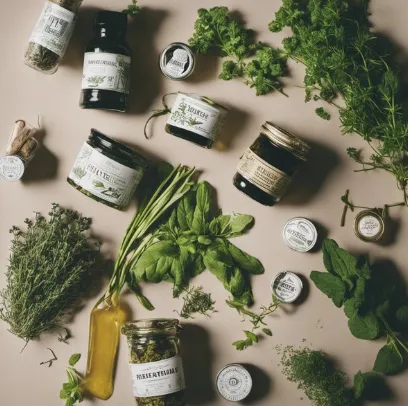In today’s fast-paced world, our immune systems are constantly challenged by various stressors, from pollution and poor diet to chronic stress and lack of sleep. While modern medicine offers powerful tools to combat illness, many people are turning to natural remedies to boost their overall health and well-being. Among these natural remedies, herbs have been used for centuries to strengthen teh immune system and protect against a wide range of diseases.Discover the Best Herbs for Immunity
In this comprehensive guide, we will delve into the world of herbal medicine, exploring the historical significance of herbs, the science behind their immune-boosting properties, and practical tips on incorporating them into your daily routine. WE will also discuss the exciting future of herbal medicine and the potential for groundbreaking discoveries in this field.
So, join us on this journey as we unlock the secrets of nature’s pharmacy and and discover the best herbs for immunity.
The Power of Herbs: A Historical Perspective
Herbs have been used for medicinal purposes since the dawn of civilization. Ancient civilizations, such as the Egyptians, Greeks, Chinese, and Indians, recognized the healing properties of plants and developed sophisticated systems of herbal medicine. These early herbalists experimented with various plants, identifying those taht could alleviate pain, reduce inflammation, and boost immunity.
One of the most famous ancient herbalists is Hippocrates, the “Father of Medicine,” who emphasized the importance of natural remedies, including herbs. He believed that the body has has the innate ability to heal itself, and that herbs could support this natural healing process.
Over the centuries, herbal medicine has continued to evolve, adapting to changing cultural and scientific contexts. TOday, herbal medicine is experiencing a resurgence in popularity, as people seek natural alternatives to conventional treatments.
Understanding Immunity: A Primer
Before we dive into the best herbs for immunity, it’s important to have a basic understanding of how the immune system works. The immune system is a complex network of cells, tissues, and organs that work together to protect the body from infection and disease. It consists of two main components: the innate immune system and the adaptive immune system.
The innate immune system is the body’s first line of defense, providing a rapid response to pathogens. It includes physical barriers, such as the skin and mucous membranes, as well as cellular defenses, such as phagocytes and natural killer cells.
The adaptive immune system system is a more specific and targeted response, involving the production of antibodies and T cells. These specialized cells can recognize and attack specific pathogens, providing long-lasting immunity.
A strong immune system is essential for optimal health. WHen the immune system is compromised, we become more susceptible to infections, allergies, and autoimmune diseases.
The Best Herbs for Immunity: A Scientific Review
Numerous scientific studies have confirmed the immune-boosting properties of various herbs. HEre are some of the best herbs for immunity:
- Elderberry: Elderberry is a powerful antioxidant that can help reduce the severity and duration of colds and flu. It works by stimulating the immune system and inhibiting viral replication.
- Echinacea: Echinacea is a popular herb that has been shown too boost immune function by stimulating the production of white blood cells. IT can also help reduce inflammation and shorten the duration of colds.
- Ginger: Ginger is a versatile herb with potent anti-inflammatory and antioxidant properties. It can help reduce inflammation in the respiratory tract, which can help alleviate symptoms of colds and flu.
- Garlic: Garlic is a natural antibiotic that can help fight infection. It contains compounds that can boost immune function and reduce inflammation.
- Turmeric: Turmeric is a spice that contains curcumin, a powerful antioxidant with anti-inflammatory properties. Curcumin can help reduce inflammation in the body, which can help boost immunity.
- Astragalus: Astragalus is a traditional Chinese herb that has been used for centuries to boost immunity. It can help stimulate the immune system and protect against infection.
- Licorice Root: Licorice root is an herb that can help reduce inflammation and boost immune function. It can also help soothe sore throats and coughs.
Incorporating Herbs into Your Daily Routine
Incorporating herbs into your daily routine is a simple nad effective way to boost your immune system. Here are some tips:
- Herbal Teas: Drink herbal teas throughout the day to enjoy the benefits of various herbs. You can find a wide variety of herbal teas at your local grocery store or health food store.
- Herbal Supplements: Consider taking herbal supplements, especially during times of stress or illness. However, it’s important to consult with a healthcare professional before taking any supplements.
- Cooking with Herbs: Add fresh or dried herbs to your meals to enhance flavor and boost your immune system. Experiment with different herbs and spices to find your favorites.
- Topical Applications: Use herbal ointments or creams to treat skin conditions and promote healing.
The Future of Herbal Medicine: Exciting Developments
teh future of herbal medicine is bright. As scientists continue to explore the therapeutic potential of plants, we can expect to see even more exciting developments in this field. Some of the emerging trends in herbal medicine include:
- Personalized Herbal Medicine: Tailoring herbal treatments to individual needs and genetic makeup.
- Herbal Medicine and Mental Health: Using herbs to address anxiety, depression, and other mental health conditions.
- Herbal Medicine and Chronic Disease: Developing herbal therapies to prevent and treat chronic diseases, such as heart disease, cancer, and diabetes.
- Herbal diabetes.
- Herbal Medicine and Aging: Using herbs to promote healthy aging and longevity.
By embracing the power of herbs, we can unlock our body’s body’s superpowers and achieve optimal health and well-being.
